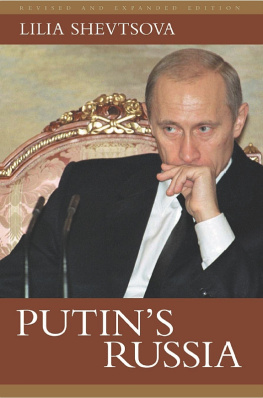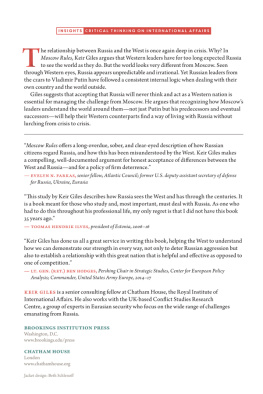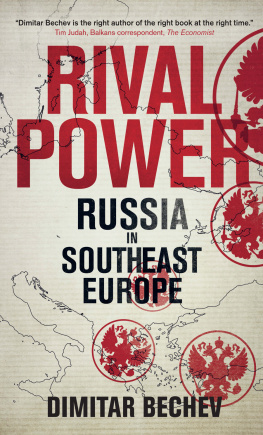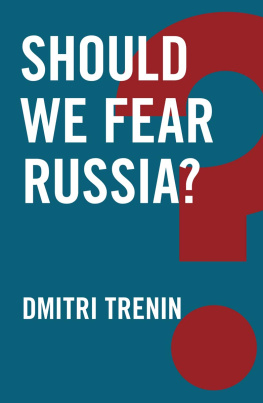
2010 Carnegie Endowment for International Peace
All rights reserved. No part of this publication may be reproduced or transmitted in any form or by any means without permission in writing from the Carnegie Endowment.
Carnegie Endowment for International Peace
1779 Massachusetts Avenue, N.W.
Washington, D.C. 20036
202-483-7600
www.ceip.org
The Carnegie Endowment does not take institutional positions on public policy issues; the views represented here are the authors own and do not necessarily reflect the views of the Endowment, its staff, or its trustees.
To order, contact Carnegies distributor:
Hopkins Fulfillment Service
PO Box 50370, Baltimore, MD 21211-4370
1-800-537-5487 or 1-410-516-6956
Fax: 1-410-516-6998
Library of Congress Cataloging-in-Publication Data
Shevtsova, Lilia Fedorovna.
Lonely power : why Russia has failed to become the West and the West is weary of Russia / Lilia Shevtsova.
p. cm.
Includes .
ISBN 978-0-87003-246-2 (pbk.)ISBN 978-0-87003-247-9 (cloth)ISBN 978-0-87003-298-1 (e-Book) 1. Russia (Federation)Foreign relations. 2. Russia (Federation)Politics and government19913. Russia (Federation)RelationsWestern countries. 4. Western countriesRelationsRussia (Federation) I. Title.
DK510.764.S545 2010
327.47dc22 2010022943
Cover design by Zeena Feldman
Contents
R ussia has made a tradition of puzzling the world with its ups and downs, its sudden course changes, and its shifting masks, thus forcing the West to constantly ask itself: Is a new policy a change of tactics or a change of paradigm?
Tough Russian policies toward its neighbors earlier this decade, culminating in the 2008 war with Georgia, have given way to a seemingly new approach in the wake of the global financial crisis and the Obama administrations reset. Today, the ruling tandem presents a far more cooperative face to the world. Yet the question remains: Does this new face represent a genuine change in direction?
In Lonely Power, Lilia Shevtsova examines the relationship between Russia and the West, the domestic roots of Russian foreign policy, and the myths that both Russia and the West maintain about each other. She provides a comprehensive assessment of the interaction between foreign policy and domestic developments in Russia and how, as she sees it, the Russian elite is using foreign policy as a tool to reproduce the traditional Russian state.
In the midst of optimistic views about Russias modernization and its rapprochement with the West, Shevtsova invites the reader to ask some probing questions: Can Medvedevs modernization be serious and sustainable when the nature of the regime has not been altered? Can rapprochement be real when the system continues to rely upon anti-Western sentiment to consolidate itself? Are political and expert communities in the West rushing to endorse an imitation democracy?
Shevtsova makes it abundantly clear that transforming Russia is a project that belongs to Russians themselves. Like any country, Russia cannot be modernized from outside. But, she believes that Russia cant succeed with its transformation when the West chooses either to stand back as a neutral observer or to actively support the status quo. Delaying change under the guise of modernization from above, she writes, only makes transformation harder. And it may compromise Western values in the process.
Shevtsova, long one of Russias most prominent and insightful political observers, sees Russia today as adrift in a sea of uncertainty. Parts of Russian society demonstrate that the country is ready to live in a new world. Many Russians believe that autocracy and hostility toward the world are not Russias destiny. Yet powerful forces of history and contemporary politics push in the opposite direction. These tensions could be resolved, Shevtsova believes, sooner than many imagine. The West, by seeking to understand Russias dilemmas, can make the process of resolving these dilemmas less painful.
Jessica T. Mathews
President, Carnegie Endowment for International Peace
W hat you are about to read are polemical essays prompted by a growing number of questions about Russiaquestions not only about its behavior in the international arena and its relations with the West, but also about the attitudes and perceptions Russia and the West hold about one another (including, not least, stereotypes). Much ink has been spilled on these topics in Russia and the West, but usually it has been spilled by writers concerned primarily with issues of the balance of power, security, and geopolitics.
However, the logic and toolkit arising out of the study of international relations do not explain much about the issues Ive mentioned. Indeed applying foreign policy categories to them can sometimes be disorienting. Foreign policy logic does not answer the question: Why does Russia so often act contrary to common sense and undermine its own positions? Consider one example of such behavior. From 20042008, the Russian ruling team seemed to be doing everything in its power to exacerbate the crisis in relations with the West, choosing political confrontation with the United States and deciding to snub Europe. By the end of the Putin presidency there was probably more distrust between Russia and Western nations than there had been in the final stages of the existence of the Soviet Union. What did Moscow earn by this muscle-flexing? Respect in the Western capitals? The trust of its neighbors? A solution to the ongoing problems of transformation? No, no, and no. Trying to explain Russias behavior by studying its foreign policy will not tell us why Russia seems continually to shoot itself in the foot.
Traditional foreign policy categories are equally futile for answering other questions as well. Why did Russia provoke the gas wars with Ukraine, when that move only convinced Europe to get serious about seeking alternative sources of energy? What problems did the war with Georgia solve? Or Moscows recognition of the independence of South Ossetia and Abkhazia? How can Moscow simultaneously view NATO as a threat and seek partnership with its members? Why does the majority of the Russian elite continue to regard the West with suspicion?
While the study of foreign policy often fails to provide satisfactory answers to such questions, the study of the domestic sources of foreign policy offers much greater clarity. We must examine Russias foreign policy as a factor in the overall equation that describes the traditional Russian systems efforts to reproduce itself, and thus come to some understanding of the internal constraints on relations between Russia and the West.
When the global financial crisis hit Russia, the Russian ruling elite began to seek new ways to survive. It returned to Peter the Greats formula of re-energizing by using the Westa formula Stalin used effectively to pursue Soviet industrialization. To use the West in order to save an anti-Western system exemplifies the highest possible degree of pragmatismand cynicism as well.
The Kremlins change in survival tactics necessitated a change in the way it behaved toward the outside world. The Russian ruling team came to understand that smiles are better than scowls for securing help, but could their smiles be trusted if they were only skin-deepthat is, if they had not changed the nature of the traditional Russian system?
One has to believe that positive change will happen, and if you believe, it has to happen! one European observer said to me. But if hope is the sole basis of the new Western optimism, then we are really in trouble. If Russian modernization with Western help fails, one can easily guess who will be blamed for subsequent failures as well.












